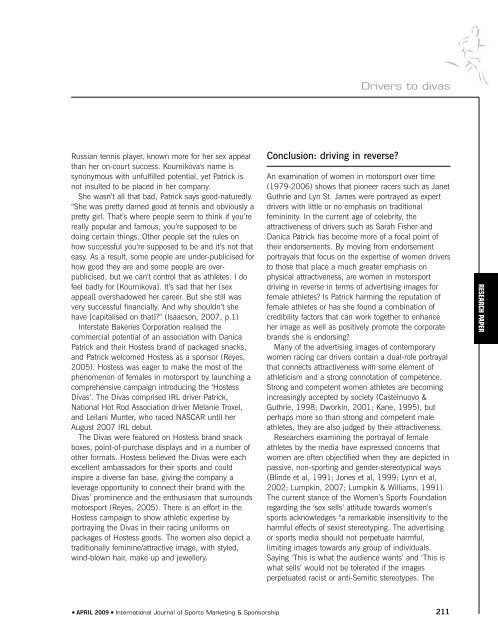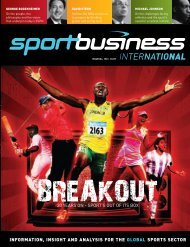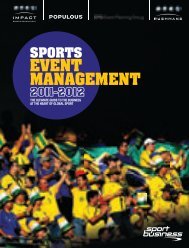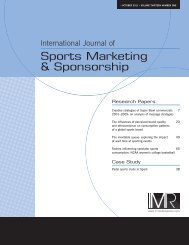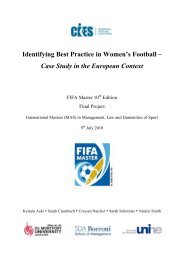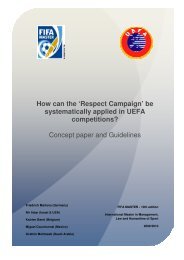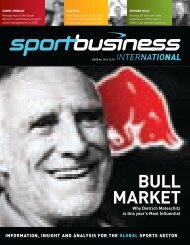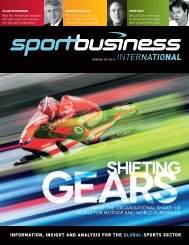Sports Marketing & Sponsorship - FIFA/CIES International University ...
Sports Marketing & Sponsorship - FIFA/CIES International University ...
Sports Marketing & Sponsorship - FIFA/CIES International University ...
- No tags were found...
Create successful ePaper yourself
Turn your PDF publications into a flip-book with our unique Google optimized e-Paper software.
Drivers to divasRussian tennis player, known more for her sex appealthan her on-court success. Kournikova's name issynonymous with unfulfilled potential, yet Patrick isnot insulted to be placed in her company.She wasn’t all that bad, Patrick says good-naturedly.“She was pretty darned good at tennis and obviously apretty girl. That’s where people seem to think if you’rereally popular and famous, you’re supposed to bedoing certain things. Other people set the rules onhow successful you’re supposed to be and it’s not thateasy. As a result, some people are under-publicised forhow good they are and some people are overpublicised,but we can’t control that as athletes. I dofeel badly for [Kournikova]. It’s sad that her [sexappeal] overshadowed her career. But she still wasvery successful financially. And why shouldn’t shehave [capitalised on that]?” (Isaacson, 2007, p.1)Interstate Bakeries Corporation realised thecommercial potential of an association with DanicaPatrick and their Hostess brand of packaged snacks,and Patrick welcomed Hostess as a sponsor (Reyes,2005). Hostess was eager to make the most of thephenomenon of females in motorsport by launching acomprehensive campaign introducing the ‘HostessDivas’. The Divas comprised IRL driver Patrick,National Hot Rod Association driver Melanie Troxel,and Leilani Munter, who raced NASCAR until herAugust 2007 IRL debut.The Divas were featured on Hostess brand snackboxes, point-of-purchase displays and in a number ofother formats. Hostess believed the Divas were eachexcellent ambassadors for their sports and couldinspire a diverse fan base, giving the company aleverage opportunity to connect their brand with theDivas’ prominence and the enthusiasm that surroundsmotorsport (Reyes, 2005). There is an effort in theHostess campaign to show athletic expertise byportraying the Divas in their racing uniforms onpackages of Hostess goods. The women also depict atraditionally feminine/attractive image, with styled,wind-blown hair, make up and jewellery.Conclusion: driving in reverse?An examination of women in motorsport over time(1979-2006) shows that pioneer racers such as JanetGuthrie and Lyn St. James were portrayed as expertdrivers with little or no emphasis on traditionalfemininity. In the current age of celebrity, theattractiveness of drivers such as Sarah Fisher andDanica Patrick has become more of a focal point oftheir endorsements. By moving from endorsementportrayals that focus on the expertise of women driversto those that place a much greater emphasis onphysical attractiveness, are women in motorsportdriving in reverse in terms of advertising images forfemale athletes? Is Patrick harming the reputation offemale athletes or has she found a combination ofcredibility factors that can work together to enhanceher image as well as positively promote the corporatebrands she is endorsing?Many of the advertising images of contemporarywomen racing car drivers contain a dual-role portrayalthat connects attractiveness with some element ofathleticism and a strong connotation of competence.Strong and competent women athletes are becomingincreasingly accepted by society (Castelnuovo &Guthrie, 1998; Dworkin, 2001; Kane, 1995), butperhaps more so than strong and competent maleathletes, they are also judged by their attractiveness.Researchers examining the portrayal of femaleathletes by the media have expressed concerns thatwomen are often objectified when they are depicted inpassive, non-sporting and gender-stereotypical ways(Blinde et al, 1991; Jones et al, 1999; Lynn et al,2002; Lumpkin, 2007; Lumpkin & Williams, 1991).The current stance of the Women’s <strong>Sports</strong> Foundationregarding the ‘sex sells’ attitude towards women’ssports acknowledges “a remarkable insensitivity to theharmful effects of sexist stereotyping. The advertisingor sports media should not perpetuate harmful,limiting images towards any group of individuals.Saying ‘This is what the audience wants’ and ‘This iswhat sells’ would not be tolerated if the imagesperpetuated racist or anti-Semitic stereotypes. TheRESEARCH PAPER● APRIL 2009 ● <strong>International</strong> Journal of <strong>Sports</strong> <strong>Marketing</strong> & <strong>Sponsorship</strong>211


